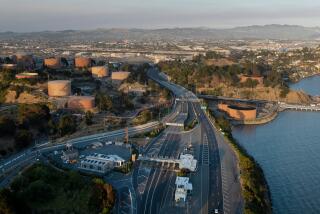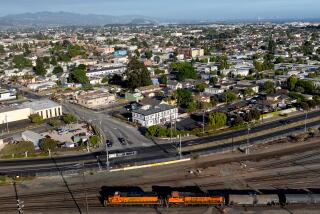Unocal Deal Is Done
- Share via
One of California’s oldest and most storied oil companies officially disappeared Wednesday as Unocal Corp. shareholders approved a buyout offer from Chevron Corp.
The $18-billion deal became final after owners of more than 77% of Unocal’s shares voted for Chevron’s offer, which seemed destined to prevail after rival bidder CNOOC Ltd. of China backed out last week amid intense congressional resistance. About 2.6% of Unocal shareholders voted against the deal with Chevron, while the remainder didn’t vote.
For the record:
12:00 a.m. Aug. 13, 2005 For The Record
Los Angeles Times Saturday August 13, 2005 Home Edition Main News Part A Page 2 National Desk 1 inches; 45 words Type of Material: Correction
Unocal deal -- An article in Thursday’s Business section about the acquisition of Unocal Corp. said shareholder Patricia Hearst was a descendant of publisher William Randolph Hearst. She is the former wife of George Randolph Hearst Jr., former publisher of the Los Angeles Herald Examiner.
Unocal, based in El Segundo, was formally absorbed by Chevron within hours of the voting, which took place at a hotel near Los Angeles International Airport during a meeting attended by about 200 shareholders and employees.
Unocal shareholders, many of whom have owned stock in the company for decades, said they were wistful about seeing the end of Unocal. But they made clear that they favored the offer from Chevron over the richer bid from across the Pacific.
“We’re very patriotic and we love Unocal, “ said Lillian Auspitz, one of two Las Vegas sisters who own shares and regularly attended the company’s annual meetings. “This is a very historic and sad day for us.”
Patricia Hearst, a longtime stockholder and descendant of publisher William Randolph Hearst, choked up as she took her turn at the microphone.
“I’m glad that we’ll stay red, white and blue. It makes my heart warm,” said Hearst, noting that she was close to Fred Hartley, who led Unocal for nearly three decades and died in 1990. “But I feel very sad to see Unocal go out.”
The combined company is the world’s fourth-largest producer of oil and natural gas and ranks No. 3 in underground reserves of those commodities. Chevron’s market value was about $140 billion as of Wednesday’s market close.
Unocal’s primary attraction is its oil and natural gas projects in Asia and the Gulf of Mexico. Chevron Chief Executive David O’Reilly has said those assets “fit like a glove” with the projects his company is developing.
Analysts noted that Chevron was struggling to find enough new oil to replace what it was pumping out of the ground.
“They had to do something because their production was falling a little bit short,” said Jeb Armstrong, an analyst with Argus Research Corp.
Chevron, based in San Ramon, Calif., will not keep the Unocal headquarters building or the Unocal name. However, the company already has offered jobs to 5,000 of Unocal’s 6,400 worldwide employees, with more offers to come. An unspecified number of job cuts are expected, with the hardest hit likely to come among corporate employees. But Chevron has said it won’t move on that front until after the end of September.
Unocal Chief Executive Charles Williamson will stay on at Chevron for a few months to help with the transition, but he and his top executives will not be part of Chevron.
“There’s some mixed feelings about what’s happening here today,” Williamson said. “We have a very proud history ... but most of our employees will join Chevron. [And] Chevron’s a very fine company.”
It was CNOOC that started Unocal down the takeover path when it approached the company in December about selling. The interest from CNOOC, whose parent is government-controlled China National Offshore Oil Corp., attracted other bidders, including Chevron and another international oil firm that was never identified.
When CNOOC failed to deliver a bid, Unocal signed a cash-and-stock deal with Chevron in early April. On June 22, CNOOC reentered the fray, making an all-cash offer of $18.5 billion for Unocal. The offer became a catalyst for heated debates in Washington about relations with China on trade, national security and monetary matters.
Chevron increased its bid, but the value remained below the CNOOC offer. CNOOC, however, withdrew from the contest last week, citing “unprecedented political opposition.”
“I think the shareholders got cheated out of $5 a share here,” George Froley, who owns options for 60,000 Unocal shares, said at the shareholder meeting. He suggested that Unocal didn’t give CNOOC much of a chance to win.
Williamson disagreed. “We seriously entertained the bid from CNOOC, and many times, we thought they would come out the winner.”
Oil prices, which hit a new closing high of $64.90 a barrel in New York on Wednesday, have jumped about 14% since Chevron and Unocal first struck their deal back in April, and some analysts are predicting that they will go even higher. Asked whether he may have sold his company too soon, Williamson replied: “It’s always a dilemma to try to forecast commodity prices. I don’t think we sold too early.”
On the other hand, some analysts have questioned whether Chevron’s purchase of Unocal would still make sense if oil prices fell.
“Our valuation of Unocal bears no resemblance to the [oil] prices that you see in the market today,” O’Reilly said. “Today’s market prices help the valuation even further because we weren’t counting on $60 oil or anything close to it.”
Unocal shares gained 55 cents to $66.10 in their last day of trading on the New York Stock Exchange. Chevron shares rose $1.26 to $62.48, while CNOOC’s New York-traded shares rose $4.17 to $76.19. Oil company shares in general moved higher in tandem with crude prices.
Under the Chevron offer, Unocal shareholders could elect to receive $69 cash, 1.03 shares in Chevron stock or a mix of both for each Unocal share they own. On Wednesday, 241.9 million shares were pledged for cash, 22.1 million for stock and 10 million shares for a mix.
The choices will be pro-rated to preserve the originally agreed-upon split of $27.60 a share in cash and 0.618 Chevron share, the companies said. Chevron said shareholders who elected all cash would actually get $30.13 in cash and 0.5803 Chevron share for each Unocal share. The payout, expected to be made around Aug. 17, is subject to a final accounting.
Unocal, founded 115 years ago as Union Oil Co. of California in Santa Paula, was once a juggernaut in the state, owning refineries, oil fields and a network of gasoline stations bearing the 76 brand. One of the company’s most tumultuous periods was in 1985, when it fended off a hostile takeover attempt from oilman T. Boone Pickens.
Saddled with debt from the fight with Pickens, in 1997 Unocal sold off its refineries and gas stations, which now belong to ConocoPhillips. By the time it became a takeover target, Unocal had little left in California but its headquarters. Most of its employees and assets were overseas.
More to Read
Inside the business of entertainment
The Wide Shot brings you news, analysis and insights on everything from streaming wars to production — and what it all means for the future.
You may occasionally receive promotional content from the Los Angeles Times.










